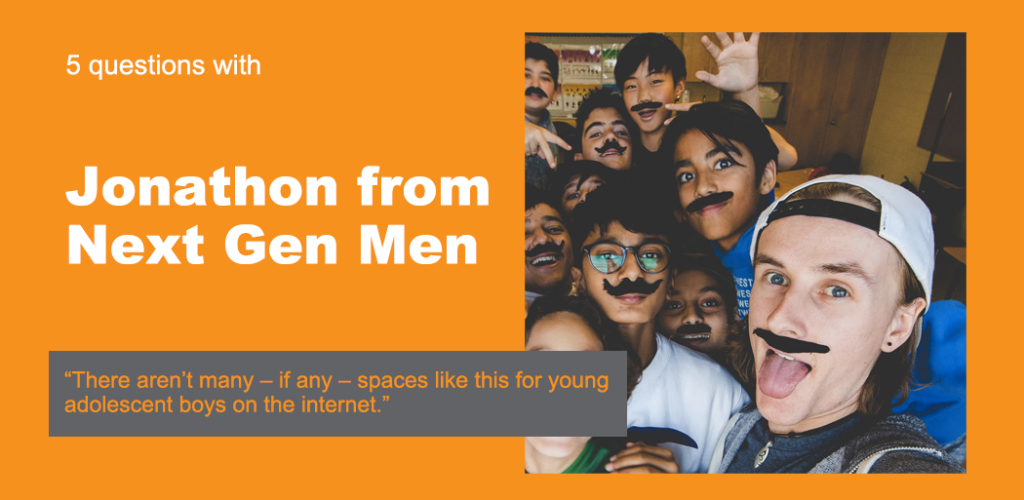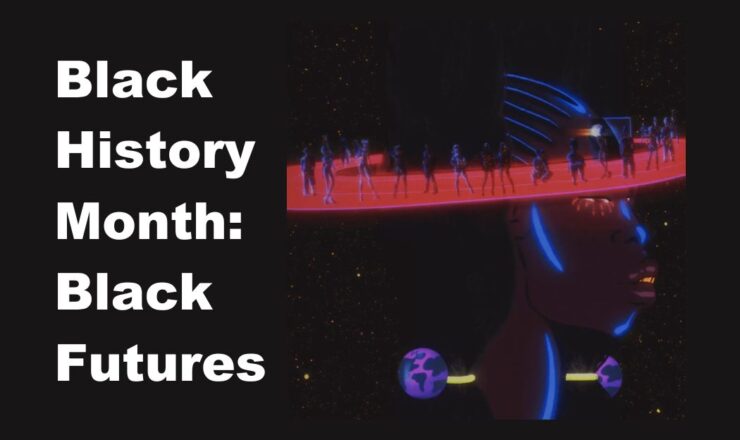

5 Questions is where Teen Health Source volunteers ask 5 questions to people about their unique perspectives on everything to do with sex and gender. In this instalment we talked with Jonathon, the Program Manager from Next Gen Men!
Next Gen Men is a Canadian nonprofit who work to change how the world sees, acts and thinks about masculinity. For adults, they offer professional development, trainings and consultations for teachers, parents, coaches and others working to promote positive youth development. For youth, they run a bunch of different programs to build emotional intelligence, giving youth skills and resilience needed for healthy relationships and mental wellbeing.
Check out their website for more info: nextgenmen.ca
I faced a lot of gender-based bullying and harassment growing up as a nonconforming boy, so I was interested in violence prevention and masculinity from a young age through to my post-secondary education. I was Next Gen Men’s biggest fan when they started in 2015—I used to respond to their newsletters saying things like, “You guys are the best, keep it up!” 🧡 So we did a couple projects together in 2017, and the following year I was invited to apply for a job with the youth program.
Over the years, I’ve seen a rise in awareness among boys about things like “toxic” masculinity, mental health, sexual harassment and consent. Not as much as you might think, though, and not everywhere. There are still countless boys’ lives in which the status quo has been steadily built and reinforced, where harmful beliefs and actions remain unquestioned and unchallenged. I usually avoid generalizations about progress on things like anti-homophobia, mental wellness, or violence prevention because talking about how things are so much better erases those for whom they’re not.
Well, most of our programs and resources are anchored in relationship. Growth and change, positive masculinity, and mental wellbeing—these things don’t magically or coincidentally happen alongside boys’ relationships with supportive caregivers and like-minded peers, they happen within their strongest and most valued relationships. 🌱
That’s why our materials help parents and educators build and maintain connections with the boys and nonbinary youth in their lives, and use those connections to foster mental wellness and violence prevention. We also do that work ourselves, offering programs and opportunities for engagement that deepen boys’ relationships with positive role models and with each other.
I’d say there is a lot of overlap in terms of what is on the minds of parents, educators, and boys themselves. The difference is that for young people, nothing is hypothetical. Their questions about sexuality and consent, their struggles with stress and mental health, their concerns about puberty, pornography, peers, feminism—all of that is deeply meaningful and relevant to their lives. Sometimes I wish parents and educators cared as much about that stuff as boys do.
Back in 2017, I went looking for meaningful discussions on masculinity, and there were none that featured the voices of boys themselves. I couldn’t help but feel that boys’ experiences, attitudes and beliefs matter. Their stories matter. We can’t possibly get anywhere by talking about positive masculinity and feminism without engaging with and listening to the next generation. So I pitched the idea to the guys I knew at Next Gen Men, and the podcast project was born.
With Breaking the Boy Code, 11- to 15-year-old boys have shared stories about bullying, stress, failure, friendship, racism and identity. We’ve used the podcast to educate and inspire parents and educators, and we’ve also used it with young people themselves. I remember sharing 15-year-old Chad’s story about hazing with a group of seventh- and eighth-graders who were astonished to hear his voice at the end of the session and realize that he was a real teenager sharing a real experience. 🤯
Anyone who knows boys knows that they can be greatly influenced by their peers. To hear an older teenager demonstrate reflection, vulnerability and self-confidence on a topic that is relevant to them—that’s impactful.
NGM Boys Club is one of the coolest things we’ve done during COVID-19. It originated as a pilot project with a couple dozen boys in the summer of 2020, and it’s since grown into an active community of more than a hundred young people across Canada. Our Discord server is a positive corner of the internet, a unique space where youth in Grades 7-9 can build connections with like-minded peers: where mental wellness, anti-bullying, and peer support are the norm.
As the moderators and facilitators, the NGM youth team ensures that NGM Boys Club is safe by maintaining a vetting process for any young people who want to join, and we help make it an inclusive and supportive space by role modelling positivity and helping participants find healing in conflict. At this point, the culture of our Discord community is known and respected, so boys themselves will intervene when others cross the line. There aren’t many—if any—spaces like this for young adolescent boys on the internet.
If you know Next Gen Men, you know we’re always up to something! For educators, we have a grassroots Canada-wide initiative taking shape—if any of this blog post has piqued your interest, join the wait list at nextgenmen.ca/educators so you don’t miss out. For young adolescent boys, we’re gearing up for the second iteration of our annual Future of Masculinity Summit, an engaging and inspiring online gathering that anchors boys to the role they have to play in achieving gender justice. Youth can join our Discord server directly at nextgenmen.ca/discord; adults who are interested on behalf of youth participants can join the wait list at nextgenmen.ca/summit. 🔥
Check out our 5 Questions tag for more interviews from this series: Link.
If you have questions about this topic, feel free to contact one of our peer educators. [Link]
Last Updated: January 2022

Learn more about Black Futures with Teen Health Source and TEACH! Listen to Paula’s interview about the future of Blackness and some highlights of work focusing on imagining new Black realities!